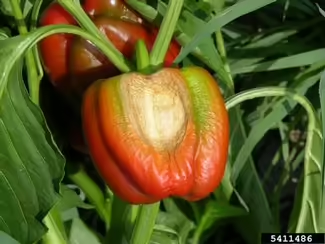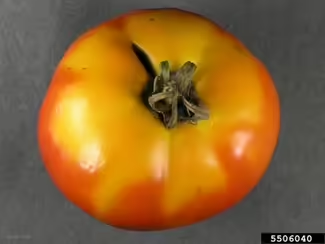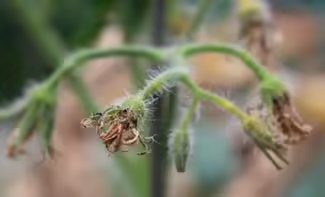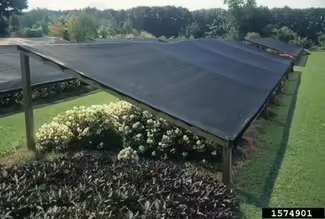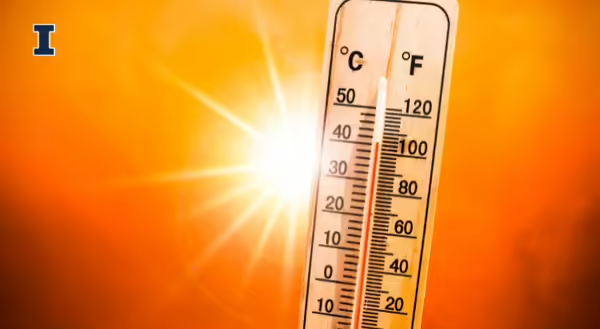
This summer season has been hot and dry with scattered rain events in Northen Illinois, which makes it difficult to regulate plant growth and quality of vegetables in the garden. When temperatures exceed 90 degrees Fahrenheit, vegetable crops may not perform as anticipated. Excessive heat can cause vegetable production issues, such as sunscald, yellow shoulder, blossom drop and pollination issues, to name a few (Burrows 2022; and Schuh and Hoidal 2025). As August approaches, it is important to scout for any heat stress symptoms in the garden to make proper production decisions to avoid crop loss and damage.
Common crop symptoms from excessive heat include the following:
Sunscald- Sunburn and scorching symptoms on fruit and sometimes plant foliage. Occurs when the plant cannot uptake enough water during hot and windy days, decreased foliage cover can also cause increased fruit exposure to sun.
Yellow shoulder in tomatoes- The top part of the flesh near the core turns yellow and becomes very hard. High temperatures exceeding 85 degrees Fahrenheit can inhibit lycopene formation, which is responsible for the red coloring in tomatoes and peppers.
Blossom drop- Flower clusters form and begin to die and fall off the plant, this is also called flower abortion. Flower abortion typically occurs at temperatures ranging from 75 to 95 degrees Fahrenheit, especially on tomato plants.
Flower formation- Female flowers are heavily impacted by hot weather, especially on vining cucurbit crops. Typically, more male flowers develop on cucurbits once temperatures reach 90 degrees Fahrenheit during the day and 70 degrees Fahrenheit at night. It is common to have more male than female flowers, but extremely hot temperatures can exacerbate the ratio.
Inadequate pollination- Pollination is important for crops like cucurbits, inadequate or quick pollination can cause malformed fruit. Bees become less active when temperatures reach 90 degrees Fahrenheit, contributing to decreased fruit set.
Taste and quality- Certain cool season vegetables can develop a bitter taste and flavor when temperatures exceed 60 degrees Fahrenheit, especially broccoli, lettuce, carrots, and snap peas. Even sugar content in muskmelons is reduced once temperatures exceed 95 degrees Fahrenheit (Burrows 2022).
Installing a shade cloth can decrease soil and air temperatures around the garden, preventing some of these symptoms from occurring. A 30% black shade cloth covering susceptible crops provides cooling and enough sunlight to maintain crop development (Emmalea Ernest and Gordon Johnson). It is also recommended to plant heat-tolerant varieties for available crops, mulch the area to reduce soil temperatures and water sufficiently for proper root development (Burrows 2022; Schuh and Hoidal 2025).
For more information, check out the University of Illinois Extension’s Local Food and Small Farms YouTube Channel for growing tips and other horticultural advice.
About the author: Alexis R. Barnes is the University of Illinois Extension Local Food Systems Small Farms Educator serving DuPage, Kane and Kendall Counties. Barnes’s areas of expertise include specialty crops, fruit quality and reduced tillage.
References:
Burrows, R. 2022. South Dakota State University Extension. Heat Causes Problems with Garden produce. https://extension.sdstate.edu/heat-causes-problems-garden-produce [Accessed 23 July 2025].
Earnest, E, Johnson, G. University of Delaware Extension. Protecting your Garden Vegetables from Heat Stress. https://www.udel.edu/academics/colleges/canr/cooperative-extension/trending/protecting-garden-veg-from-heat-stress/ [Accessed 24 July 2025].
Schuh, M, Hoidal, N. 2025. University of Minnesota Extension. How Excessive Heat Affects the Vegetable Garden. https://extension.umn.edu/planting-and-growing-guides/how-excessive-heat-affects-vegetable-garden [Accessed 23 July 2025].
Have a question for the Master Gardeners? Residents can contact the Kendall County Master Gardener volunteers on Monday, Wednesday, and Friday from 9 a.m. to 12:30 p.m. by calling 630-553-5823, stopping in at 7775B IL Route 47, Yorkville, or emailing uiemg-kendall@illinois.edu. For helpful hints on what to include in your email, please visit go.illinois.edu/HelpDeskMGdkk.
<Photo 1 Caption> Sunscald damage on a mature pepper plant. Courtesy: Don Ferrin, Louisiana State University Agricultural Center, Bugwood.org
<Photo 2 Caption> Yellow shoulder damage on the top of a maturing tomato. Courtesy: Bruce Watt, University of Maine, Bugwood.org
<Photo 3 Caption> Blossom drop symptoms on tomato flowers. Courtesy: Utah State University Extension
<Photo 4 Caption> Malformed cucumber on the vine caused by poor pollination. Courtesy: Gerald Holmes, Strawberry Center, Cal Poly San Luis Obispo, Bugwood.org
<Photo 5 Caption> Large black shade cloth installed above a garden to reduce air and soil temperatures. Courtesy: Gerald Holmes, Strawberry Center, Cal Poly San Luis Obispo, Bugwood.org
